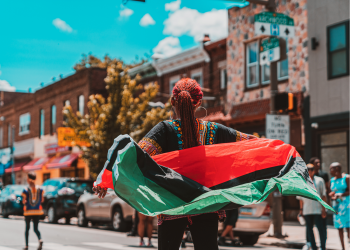by Kelly A. Cherwin, Arthur L. Gregg, and Shadia Alvarez

Tippman98x/Shutterstock
“Today Juneteenth commemorates African American freedom and emphasizes education and achievement. It is a time for reflection and rejoicing. It is a time for assessment, self-improvement and for planning the future. Its growing popularity signifies a level of maturity and dignity in America long over due. In cities across the country, people of all races, nationalities and religions are joining hands to truthfully acknowledge a period in our history that shaped and continues to influence our society today. Sensitized to the conditions and experiences of others, only then can we make significant and lasting improvements in our society.”
Kelly Cherwin, director of editorial strategy for HigherEdJobs had the opportunity to speak with two higher education professionals on what Juneteenth means to their campus, capture a glimpse into different celebrations, and how campuses can acknowledge and reflect on denouncing racism on campus. The following are responses from Shadia Alvarez, senior vice president for equity and strategic development and executive director of the Coretta Scott King Center and Arthur Gregg, M.Ed, assistant vice president, multicultural affairs/director, multicultural center, The University of Texas at Dallas.
Kelly Cherwin: What does the celebration of Juneteenth look like on your campus?
Shadia Alvarez: Antioch College is focusing on community care and joy. Students, staff, and faculty will have a day to reflect, connect, and practice purposeful care for each other and their families, and their greater community, including Yellow Springs, OH, where Antioch is located. We also will be involved in a series of get-togethers at our local parks.
Arthur Gregg: At UT-Dallas, we believe in “edutainment” which is combining education and entertainment. I’ll discuss the last program we had on campus pre-pandemic. We always have food. We have a live band, giveaways, games, trivia, speakers, a bake-off, t-shirts. We typically read the emancipation proclamation, particularly the piece about the freeing of the slaves, we all sing “Lift Every Voice and Sing.” It’s a huge campus wide celebration. Last year we had a book talk surrounding Michelle Obama’s book, “Becoming.” We had a virtual day party with the goal of helping others create their own Juneteenth celebration wherever people were at. I’m guessing UT-Dallas has been celebrating Juneteenth for at least 30 years.
Cherwin: Why is the celebration of Juneteenth important for your campus community?
Alvarez: This celebration marks both a historical moment and a re-commitment to uplifting stories, narratives, and history contributing to the building of community, the amplifying of voices previously not heard, and an understanding that history must include all of our moments of courage and stories. Juneteenth was named an official holiday for Antioch College last year through the efforts of one of our current students, Chris Chavers, Class of 2021.
Gregg: Our tagline is “you belong here” which our campus believes. To belong somewhere you have to feel a part of it so that is why is it important to us that everyone be involved. We’ll invite anyone. Our campus values diversity. Our campus values inclusion. Our history is American history. To see the faculty and staff educate new faculty and staff who may have come from places that didn’t celebrate Juneteenth is exciting. This is the second independence and that is why celebrating Juneteenth is so important to us. It is a campus sense of pride.
Cherwin: We know that there must be more than just statements issued denouncing racism. How can the leaders, staff, faculty and/or students help in efforts to dismantle racism on campus, and, as the aforementioned statement says, “make lasting improvements for our society?”
Alvarez: A landmark of Antioch College’s education is acting for justice, and the College has taken the stance that we must be actively involved in the education, training, and amplifying of voices at the margins. We must actively bring those to the center in our institutional landscape and be willing to remediate the places where we fall short. We are all learning, building, and co-constructing a new understanding of each other’s needs, opportunities, and access. Antioch stands proudly as an institution on the journey to being antiracist and committed to all that entails, everything from centering student experiences, supporting diverse faculty, and re-organizing our priorities to include networks of support for students and staff in a post-COVID-19 environment. The goal is to strengthen our community’s understanding of oppression and ensure we are purposefully building towards a better humanity.
Gregg: Denouncing racism is everyone’s job. It isn’t just the office of diversity, equity and inclusion’s (DEI) job. Everyone has to be a DEI advocate. Everyone must promote it, from the president’s office to the groundkeepers. It has to be promoted in our meetings, our classrooms, our athletics, whatever we do as an institution. It is not a reaction, it’s a way of life that is institutionalized within our campus.
Another action item that our campus instituted, under President Richard C. Benson, was assembling a Living our Values Task Force with a goal of discussing issues of systemic racism, inherent bias, equity, diversity, access, and inclusion within the campus community. We listened to the call of actions and demands from students, staff and faculty to address these campus wide issues. We are not perfect, we are growing, but, the people and the students make the experience the best and I’m proud to be a part of it.
How is your institution honoring and celebrating Juneteenth? Why is it important for your campus community? How are you making lasting improvements for our society?
Learn more about Juneteenth: What Is Juneteenth?

